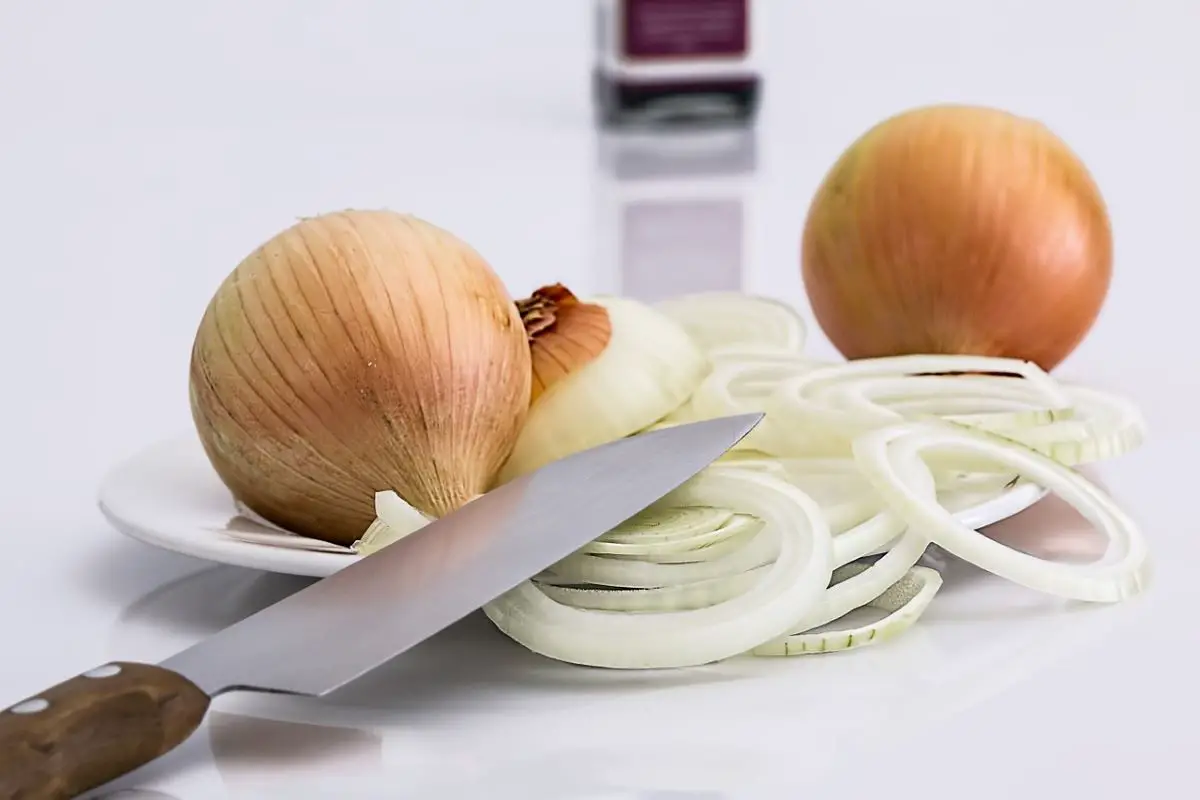Onions have been cultivated for thousands of years in various climates and countries across the world. They are used in cooking dishes from all over the world.
Yes, an onion is a vegetable. The scientific name for the onion is Allium cepa. It belongs to the family of plants called Amaryllidaceae. Its plant leaves are large and hollow and have long stems. The leaves of this plant do not grow upright but rather bend downwards. The onion bulb is the fleshy, globular part of the onion used in cooking.
All onions are not alike, as they can be found in different colors, shapes, and sizes. Onions can come in different colors, such as red, white, and yellow. They can be round or oblong in shape and large or small.
Onions are very nutritious even though they may have a bad reputation for smelling bad when cut open. This vegetable is rich in vitamin C, B6, and potassium while also containing moderate amounts of iron, calcium, and magnesium. Onions are also a good source of dietary fiber and folic acid.
Why Is Onion A Vegetable?
Onion is a vegetable because it is the edible bulb of a herbaceous plant, Allium cepa. The onion plant has other edible parts, like the leaves and stems, but we typically use the word “onion” to refer to the bulb, which forms from the base of the plant.
The term “vegetable” can be tricky to define, as many people use it more broadly than its scientific counterpart (that is, they might consider anything that grows in the ground to be a vegetable). But scientifically speaking, onions are vegetables because they meet all of the following criteria:
They have no woody tissue. Onions have green shoots that grow above ground and bulbs that grow below ground. The bulbs and shoots are both made up of fleshy tissues with no woody cells. This distinguishes them from plants like apple trees or grapevines, which have woody cells in their stems. Unlike apple trees or grapevines, onions are herbaceous plants—they contain no woody tissue in any part of their stems or shoots.
Onions are grown for food. Onion plants are grown for their edible bulbs and not for other purposes (like flowers or lumber).
How Do You Define Vegetables?
The USDA defines vegetables as “any succulent, herbaceous plant or any part of such a plant edible by humans, including roots, stems, leaves, and flowers.” This definition differs from that of fruits in that fruits are the edible portion of plants that bear seed. According to this definition, cucumbers, tomatoes, and avocados would be considered vegetables based on their use in cooking and the fact they are not sweet enough to be eaten as fruit.
Why Do Some People Classify Onions As Fruits?
A few botanists and culinary professionals classify onions as fruits. This contradiction is due to a simple misunderstanding of the definition of “fruit.”
Onions are classified as bulbs and are members of the Allium genus alongside garlic, leeks, shallots, scallions, chives, and more. They’re also classified as vegetables if you’re looking at their nutritional value because they’re low in sugar and don’t have many vitamins or minerals that make something a fruit.
But if you look at how onions grow, it’s easy to see why some people argue that they’re fruits. A fruit contains seeds or seeds inside it produced by a flower or plant. Onions develop from flowers and grow from bulbs with layers of concentric rings (or scales) in between their outer skin and inner core. These layers contain small bulblets that will become seeds when pollinated by bees.
Can Onions Be Classified As Root Vegetables?
Onions are often classified as root vegetables because they grow underground and have edible roots. However, they also grow stems above ground and leaves that can be harvested and eaten, making them more similar to leaf vegetables than root vegetables.
Most Common Mislabeled Vegetables & Fruits?
Many people who buy vegetables and fruit don’t know that they can be mislabeled in stores—and that it’s a common occurrence. If you’re wondering what vegetables and fruits are most commonly mislabeled in stores, this article is for you!
The most common vegetables and fruits mislabeled as something else are potatoes, tomatoes, avocados, and oranges. These products are often substituted for more expensive items with similar qualities or appearances.
Are Onions Easy To Grow?
Onions are one of the most common vegetables used in cooking, and they also make tasty snacks when eaten raw. They are easy to grow and can be planted in just about any soil type. If your soil is of poor quality, it might take longer for your onion bulbs to mature, but they will still taste just as good!
The first step in starting an onion garden is choosing a location with plenty of sunlight during the daytime hours. You may need some help from someone else so that they can help measure out how much space you will need for each plant; however, once this process has been completed, it should be pretty straightforward.
If your soil isn’t very fertile, you may want to add some compost before planting anything else into it, such as other vegetables or flowers. The next thing is deciding what kind of onions would best suit your needs depending on whether or not they will be used primarily as garnishes or eaten raw with salads.
What Are The Benefits Of Eating Onions?
Eating onions regularly can provide you with several health benefits. These include lowering your risk of several types of cancer, improving your immune system, and even helping to prevent heart disease.
Onions contain high levels of sulfur compounds, which help improve the health of your skin. They also have strong antibacterial and antiviral properties. These viruses and bacteria can cause diseases such as the flu and colds, so eating onions can make your body more resistant to these infections. You may wish to make a habit of eating raw onion when you feel like you are coming down with something.
Onions also contain an abundance of nutrients that are important for the proper development and maintenance of a healthy body. These nutrients include vitamins A, B6, C, and E, folate, manganese, copper, iron, calcium, fiber, and protein. All of these nutrients are essential for maintaining good health and preventing disease.
Conclusion
The confusion on whether or not the onion is a vegetable stems from two different definitions of the word vegetable. The first definition would be a green, leafy, edible plant such as broccoli or tomato. Onions are not a green, leafy, edible plant.
Secondly, the word vegetable means any part of an entire plant that can be eaten. Onion is the white bulb outside of the vegetable, and the green stalk inside is called an aceituna because it contains essential oils used to flavor meats.
Even though they may not be considered a vegetable because of their definition as a “green, leafy edible plant,” it is still considered one of my many people if you were to ask around. We hope this article helped clarify most of your doubts regarding onions.
You May Like These Articles As Well:
 Being Human
Being Human




